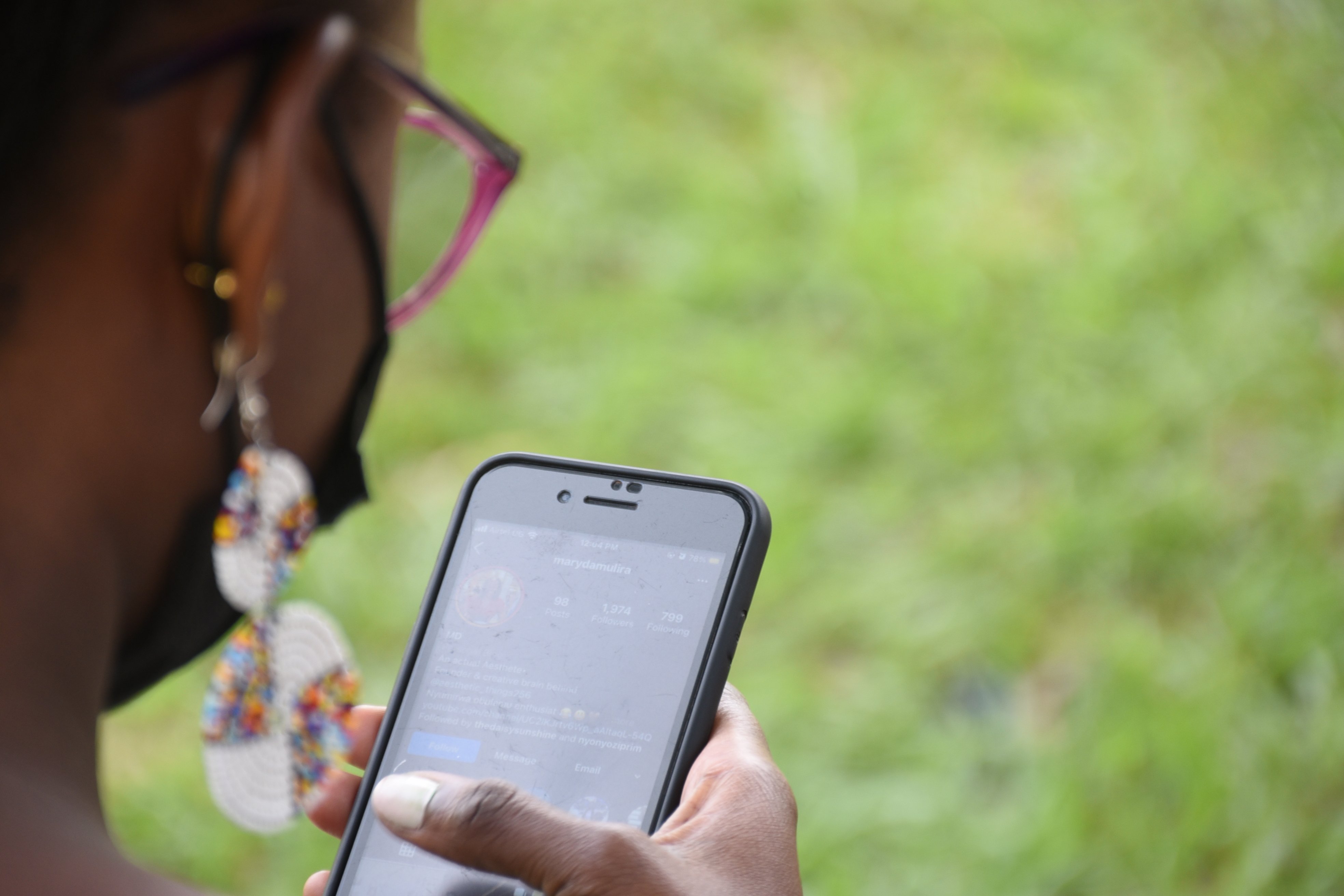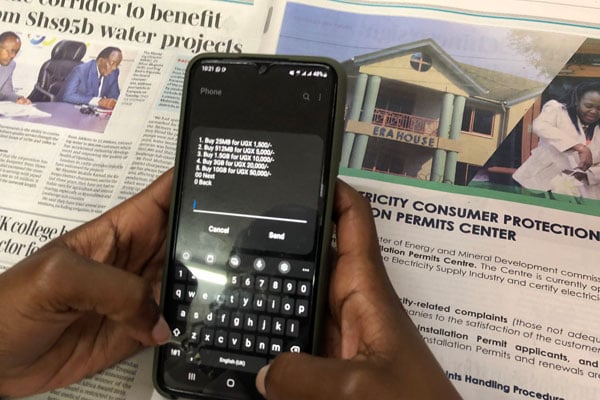East Africans paying most for slowest connection globally

A woman uses Internet in Uganda. PHOTO/EDGAR R. BATTE
What you need to know:
- High data costs could be impacting internet use, in terms of the length of time people spend online and what they do there.
At the opening of the African preparatory meeting for the second World Technology Standardisation Assembly in Nairobi on February 5, Kenya’s Cabinet Secretary for Information, Communication, Technology and the Digital Economy Eliud Owalo described the significance of digital transformation to the economy.
“Kenya recognises ICT as the driver of the digital transformation of our economy,” Mr Owalo said, adding that the sustained growth of the ICT sector will “open up employment and wealth generation opportunities for the youth.”
Indeed, many publicly available studies have proven that digitisation and ICT systems are essential drivers of economic growth in today’s world, as the fourth industrial revolution.
Yet, internet, the anchor of digitisation, remains inaccessible to many Kenyans, despite interventions meant to make it cheaper and faster to drive the growth of the ICT industry.
The high cost of internet connection, coupled with its wavering reliability and poor governance in the country have kept it out of reach for many that need it, reducing the internet to just an entertainment medium with few making constructive use of it, data shows.
Sharon Michelle, a student at Kenya’s Machakos University, for instance, says she spends more on internet monthly than she spends on academic documents like pamphlets and hand-outs, because she has to.
“I cost-share with a couple of other students to be able to afford the fixed internet subscription we use, but it still costs me more monthly than any other academic expenses,” she told The EastAfrican.
Similarly, Maxwell Odhiambo, a former operator of a cybercafé in Migori, Kenya’s Lake region, could not keep up with the high cost of internet. The recent graduate operated his young business for eight months without reaching the breakeven point and finally opted to close it down.
“I got some wireless unlimited internet connection for the business. But it was costing me more monthly than even the rent I was paying for the shop. After some time, I switched to mobile data but it was still too expensive,” he said.
Their sentiments are not uncommon among Kenyans, and much less among other East Africans, mostly students, youth, and small business owners, who continue to grapple with high internet costs despite the growing dependence on connection for daily economic activities.
Data shows that East Africa’s internet is not the most expensive in the world, but given the incomes in the region, it is much less affordable than other regions. Also, compared with other developing countries, residents in the region are paying more for connection, but getting slower speed and quality.
According to the latest Global Digital Report compiled by Meltwater, a global media monitoring firm, in collaboration with other data firms like Statista, Kenyans pay averagely $0.59 (Ksh94.13) for every gigabyte (GB) of mobile data or dial-up internet connection.
Comparatively, the same quantity of mobile data connection costs $0.39 in Nigeria, $0.40 in Ghana, $0.63 in Morocco, $0.65 in Egypt and $1.81 in South Africa. In Israel, it is $0.02.
However, while Kenyans have a connection speed of averagely 21.78 megabytes per second (mbps) for dial-up internet, in Nigeria, where it is cheaper, the speed is on average 26.48mbps. In Israel, it is 40.16mbps.
Mobile internet speed is also stagnant in Kenya, compared with other countries. It was slower in Nigeria than Kenya in 2022, but the dynamics have since changed.
For fixed internet, which is generally considered more reliable than dial-up internet, Kenyans pay an average of $1.76 (Ksh280.8) for every mbps of unlimited connection speed.
This is more than double the cost in South Africa ($0.60) and Egypt ($0.16). It also beats the average prices in Nigeria ($1.72) and Morocco ($1.16). Yet, again, this doesn’t reflect in the speed enjoyed by the consumers.
In Kenya, the average broadband internet speed is 9.78 mbps, five times less than South Africa’s 49.71 mbps. In Nigeria, the speed is 26.48 mbps, Morocco (36.53 mbps), Egypt (22.11 mbps), and the global average is 48.61 mbps.
This is despite active efforts by the government to connect more people, even outside the capital Nairobi, to broadband internet.
According to Mr Owalo, 8,419 kilometers of optic fibre has been constructed in Kenya’s remote counties since October 2022, and 2,261 new public Wi-Fi hotspots deployed.
Internet access has increased, but so have the costs. According to statistics, 40.8 percent of Kenyans currently have internet access, up from 32.7 percent in 2022.
The Kenya National Bureau of Statistic’s Population and Housing Census done in 2019 estimated that just 22 percent of Kenyans aged above three had access to the internet. Compared with other countries, Kenya and its East African peers are far much behind.
In South Africa, 74.7 percent of the population have internet access; Morocco (90.7 percent), Egypt (72.2 percent), Ghana (69.8 percent), and Nigeria (45.5 percent).
Besides the government’s efforts, Kenya has also been a leading destination of international development finance institutions and venture capital investments for internet connectivity.
Poa Internet, for instance, a Nairobi-based broadband internet firm, has attracted multiple investments — from Seedstars Africa Ventures (co-funded by the European Investment Bank) and Africa50 — on the promise of providing affordable home broadband internet for Kenyans.
Costly internet is not unique to Kenya, however. Available data shows that it is much more expensive in other East African Community partner states, partly forcing many people in the region to keep off the internet.
According to Meltwater’s ranking, of the 20 countries where broadband internet is least affordable, three are in EAC, with Burundi currently leading the pack. Others are Somalia and the Democratic Republic of Congo (DRC).
Curiously, Burundi is also among the 10 countries with the slowest broadband and dial-up internet speed globally.
The high cost of internet and the corresponding poor speed could partly be responsible for the vast number of East Africans currently unconnected to the internet. Amongst the 20 countries with the highest proportion of their population lacking access to the internet, five are East African – DRC (72 percent), Tanzania (68 percent), Uganda (73 percent), Burundi (88 percent), and South Sudan (87 percent).
At the same time, this could be impacting internet use, in terms of the length of time people spend online and what they do there.
In South Africa, where broadband internet is fastest on the continent, people spend averagely 9 hours 24 minutes using the internet daily. Most of this time is spent doing economically productive work as South Africans only spend an average of 3 hours 41 minutes on social media each day.
In Kenya, less than 4 hours is spent on the internet, but most of it is spent on social media as the average time Kenyans take on social platforms each day is estimated to be 3 hours 43 minutes.
Consequently, countries in the region rank poorly in the digital quality of life (DQL) index, a metric by cybersecurity firm Surfshark, which ranks countries based on their internet affordability, quality, governance, and infrastructure.
“Internet access creates a huge difference. My research showed that the lack of internet for school children, for example, magnifies difficulties in education, and for those connected, it improves academic excellence,” Ms Mutemi told The EastAfrican in an interview.
Ms Mutemi is currently leading a case at the Kenya’s Court of Appeal to have the government declare the internet a fundamental human right, paving the way for the removal of the excise duty.
“In a country where there’s a huge population that’s unconnected, added to the high cost of internet, the government is only delaying the benefits society gets from internet access,” she said.
Our queries to regulators in charge, the ICT Authority and the Communication Authority of Kenya, on why internet remains expensive in Kenya despite slow speed compared to other countries, went unanswered.
*Written by Vincent Owino




